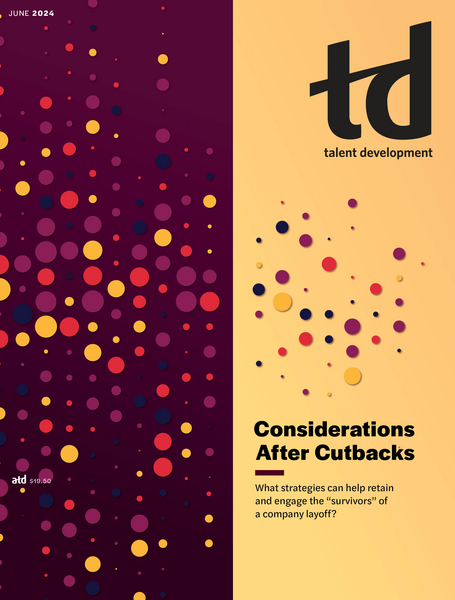TD Magazine Article
Artificial Hesitation
Companies are excited about the potential of artificial intelligence, but what will it cost?
Mon Jun 03 2024

Eighty-two percent of organizations worldwide have invested in artificial intelligence, according to Orgvue's Human-First, Machine Enhanced: The Role of AI in Workforce Transformation report. Many of those commitments are immediate. One-third of 1,000 C-suite and senior decision makers of medium and large companies said they will increase their AI investment by more than 50 percent in 2024.
"Organizations are beginning to realize that the practicalities of embedding AI into core business operations is far from simple," says Orgvue CEO Oliver Shaw in a press release. "There's a dichotomy between the need for business leaders to prepare for AI entering the workforce, their desire for change, and the organization's ability to make this transformation a reality."
Most business leaders are excited about AI's potential growth and productivity, Orgvue reports. Despite enthusiasm, however, the practical concern of the best way to implement AI technology is overwhelming.
"This gap in thinking stems from a lack of clarity on exactly how AI will impact the business and the workforce," Shaw explains. "Indeed, our research indicates spending so far has been more of a gold rush than a carefully plotted journey. This will make managing the transformation all the harder."
In fact, 70 percent of respondents feel a responsibility to hold off on implementation to protect their businesses from redundancies; to proactively prevent that, 80 percent of employers plan to upskill employees on how to use AI in the workplace.
Among points of concern is the idea that AI will replace staff. Respondents said they expect AI to supplant job positions in their organization and think AI will be the main driver of workforce transformation during the next three years.
Those anxieties aren't unfounded, according to a joint report from the Society for Human Resource Management and the Burning Glass Institute. Generative Artificial Intelligence and the Workforce reveals that companies adopting generative AI will have to navigate several disruptions, which could come with "a high human cost." The report states that generative AI will affect HR functions such as talent acquisition, employee development, and compensation.
"To achieve their AI ambitions, CEOs should arm themselves with a better understanding of how AI will truly impact the work their people do today and the skills their organization has, as well as how this may change over time," Shaw adds.

